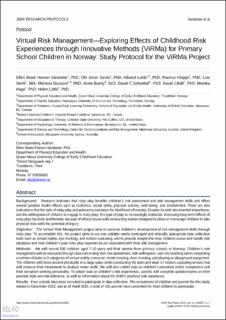| dc.contributor.author | Sandseter, Ellen Beate Hansen | |
| dc.contributor.author | Sando, Ole Johan | |
| dc.contributor.author | Lorås, Håvard Wuttudal | |
| dc.contributor.author | Kleppe, Rasmus | |
| dc.contributor.author | Storli, Lise | |
| dc.contributor.author | Brussoni, Mariana | |
| dc.contributor.author | Bundy, Anita | |
| dc.contributor.author | Schwebel, David C | |
| dc.contributor.author | Ball, David | |
| dc.contributor.author | Haga, Monika | |
| dc.contributor.author | Little, Helen | |
| dc.coverage.spatial | Norway | en_US |
| dc.date.accessioned | 2023-06-21T07:24:37Z | |
| dc.date.available | 2023-06-21T07:24:37Z | |
| dc.date.created | 2023-06-13T11:44:55Z | |
| dc.date.issued | 2023 | |
| dc.identifier.citation | JMIR Research Protocols. 2023, 12, 1-15. | en_US |
| dc.identifier.issn | 1929-0748 | |
| dc.identifier.uri | https://hdl.handle.net/11250/3072401 | |
| dc.description.abstract | Research indicates that risky play benefits children’s risk assessment and risk management skills and offers several positive health effects such as resilience, social skills, physical activity, well-being, and involvement. There are also indications that the lack of risky play and autonomy increases the likelihood of anxiety. Despite its well-documented importance, and the willingness of children to engage in risky play, this type of play is increasingly restricted. Assessing long-term effects of risky play has been problematic because of ethical issues with conducting studies designed to allow or encourage children to take physical risks with the potential of injury. | en_US |
| dc.description.abstract | Virtual Risk Management—Exploring Effects of Childhood Risk Experiences through Innovative Methods (ViRMa) for Primary School Children in Norway: Study Protocol for the ViRMa Project | en_US |
| dc.language.iso | eng | en_US |
| dc.rights | Navngivelse 4.0 Internasjonal | * |
| dc.rights.uri | http://creativecommons.org/licenses/by/4.0/deed.no | * |
| dc.subject | anxiety; | en_US |
| dc.subject | childhood education; | en_US |
| dc.subject | childhood risk experiences; | en_US |
| dc.subject | eye tracking; | en_US |
| dc.subject | injury prevention; | en_US |
| dc.subject | motion capturing; | en_US |
| dc.subject | physical activity; | en_US |
| dc.subject | resilience; | en_US |
| dc.subject | risk management; | en_US |
| dc.subject | risky play; | en_US |
| dc.subject | social skills; | en_US |
| dc.subject | validation; | en_US |
| dc.subject | virtual reality; | en_US |
| dc.subject | well-being; | en_US |
| dc.subject | willingness; | en_US |
| dc.subject | Xsens. | en_US |
| dc.title | Virtual Risk Management—Exploring Effects of Childhood Risk Experiences through Innovative Methods (ViRMa) for Primary School Children in Norway: Study Protocol for the ViRMa Project | en_US |
| dc.title.alternative | Virtual Risk Management—Exploring Effects of Childhood Risk Experiences through Innovative Methods (ViRMa) for Primary School Children in Norway: Study Protocol for the ViRMa Project | en_US |
| dc.type | Peer reviewed | en_US |
| dc.type | Journal article | en_US |
| dc.description.version | publishedVersion | en_US |
| dc.rights.holder | ©2023 Authors | en_US |
| dc.subject.nsi | VDP::Pedagogiske fag: 280 | en_US |
| dc.subject.nsi | VDP::Education: 280 | en_US |
| dc.source.pagenumber | 1-15. | en_US |
| dc.source.volume | 12 | en_US |
| dc.source.journal | JMIR Research Protocols | en_US |
| dc.identifier.doi | 10.2196/45857 | |
| dc.identifier.cristin | 2154056 | |
| dc.relation.project | Norges forskningsråd: 324155 | en_US |
| dc.source.articlenumber | e45857 | en_US |
| cristin.ispublished | true | |
| cristin.fulltext | original | |
| cristin.qualitycode | 1 | |

